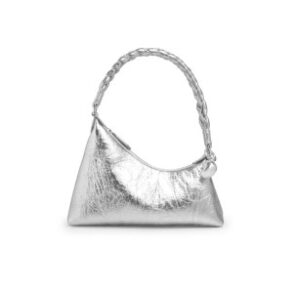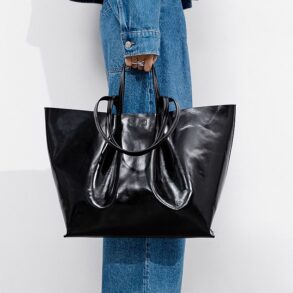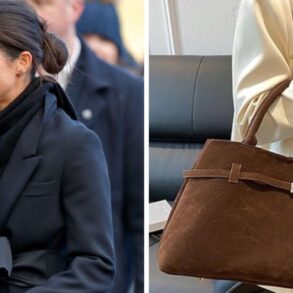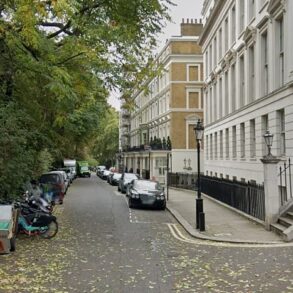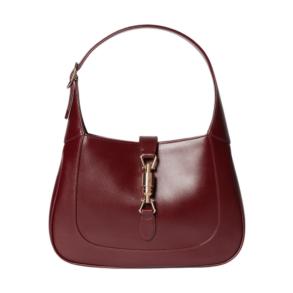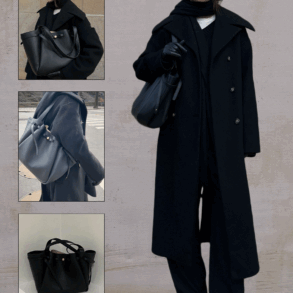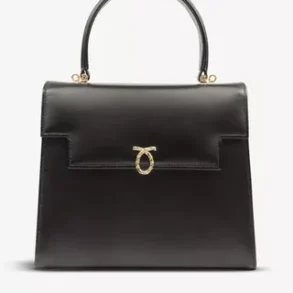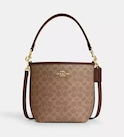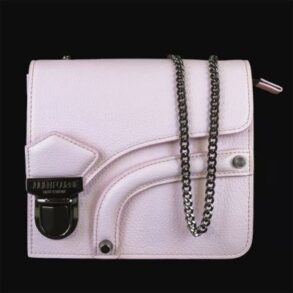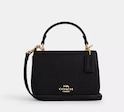World-famous for its Roman baths and sweeping Georgian crescents – not to mention its starring role in Jane Austen adaptations and the hit period drama Bridgerton – it is the only city in the UK designated a UNESCO World Heritage Site.
But, for a certain part of society, the appeal of Bath is not in its rich history, stunning architecture or hot springs. Instead, it lies in stealing from the shops that line its quaint, bustling streets.
Analysis of police figures last month showed the problem is escalating faster in the prosperous Somerset city than anywhere else in the country. Recorded shoplifting offences in Bath rose by more than 83 per cent in the 12 months to September, according to the analysis by policy consultancy Public First. That amounts to 138 per 10,000 people – the eighth-worst place in England overall.
‘Bath is a lovely city but shoplifting is definitely a problem,’ a manager at one leading fashion chain, who did not wish to be identified, told the Mail. ‘Some of the shoplifters are well-known to us. There’s one we call ‘gilet guy’ – he’s always after our £132 fur gilets. Sometimes he gets away with it, sometimes he doesn’t – because we grab it back off him.’
Ifor Stanton, 55, manager of the nearby Amathus wines and spirits shop, told us of multiple thefts from his shelves, amounting to thousands of pounds of stock per year. Items targeted recently include a £45.50 bottle of Mataroa Mediterranean dry pink gin, the preferred tipple of one light-fingered repeat visitor to the shop.
So brazen are the thieves, one even swiped an £80 bottle of Kenyan Procera Blue Dot gin from the shop counter behind which Mr Stanton and his assistant stand.
‘They’ll steal from right under your nose,’ Mr Stanton said. ‘Sometimes they come in pairs, one watching to see if we’re looking the other way so the other can grab things from the shelves. We have a ‘don’t endanger yourself’ policy when tackling these people but reporting every incident to the police is time-consuming and often doesn’t lead to anything.’
At another women’s fashion outlet, a member of staff said: ‘It’s sad. A couple of weeks ago we had a £200 handbag stolen from the shop window. It’s cheeky. When the thief came in, he already had an armful of gift boxes he had stolen from the Knoops chocolate shop across the road. But he ran off. It’s frustrating for us.’
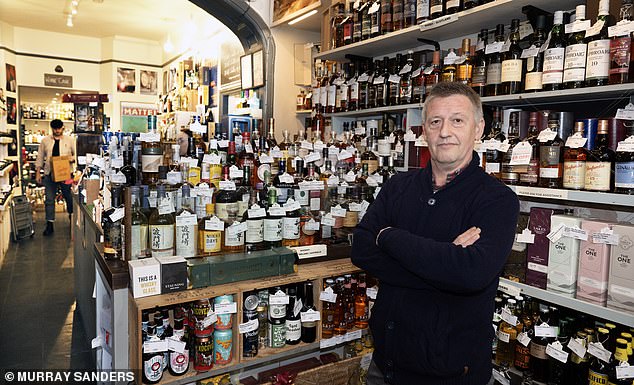
Matt Dettman, 43, manager at the Anthropologie clothing and homeware store in the centre, said: ‘Sometimes it feels co-ordinated, like the offenders are being controlled in some way. It feels it’s happening on average three or four times a week.’
Even charity shops have suffered. A worker at one store that raises funds for Dorothy House, which offers free end-of-life care, said: ‘Shoplifting is definitely on the increase. We used to have a high-end rack of clothes among our stock but we’ve stopped that now because the stuff was just getting stolen.’
Many are of the opinion that Bath has become a target for organised shoplifting gangs because of its upmarket reputation and high footfall. Busy, crowded shops make it more difficult for staff to keep an eye out for thieves. They also strongly believe that rough sleepers, who are a visible presence in the city centre, are being recruited to steal specific items to order for the gangs. These gangs then sell high-value items at car boot sales or online for around a third of their value, with the homeless involved receiving a small cut.
‘It has become like the Wild West,’ one source involved in tackling shoplifting in Bath told the Mail.
‘The items the shoplifters are targeting are mostly alcohol, meat, clothing and cosmetics – relatively high-value stuff they know they can sell on. Last year heated throws from Lakeland became a thing they were targeting.
‘Of course, some shoplifting is still opportunistic crime committed by someone who is hungry or desperate, either through poverty or drug or alcohol problems. But sometimes the homeless are commissioned to steal something or used as lookouts. Sometimes the thieves will drop off the stolen goods with a rough sleeper – or someone who appears to be a rough sleeper – as they flee so that if they are caught, then they have nothing incriminating on them.’
Just last week, Sir Keir Starmer pledged to crack down on crime, by recruiting an additional 13,000 police officers and ensuring a named, contactable neighbourhood ‘bobby on every beat’.
But until those vows – which are set to be introduced over the course of this Parliament – come into force, Bath must continue to take measures into its own hands.

It has already started to do this in the form of Bath Business Improvement District (BID), a business-funded body formed to improve the city centre’s commercial area, which has developed several initiatives to tackle the epidemic.
One is an online reporting platform on which shops can share photos (taken on security guards’ body cams or CCTV) and information about persistent offenders. Called Disc (‘Database and Intranet for Safer Communities’) Against Crime, it includes a weekly newsletter highlighting new offenders. In addition, 160 businesses are connected via a radio system to ‘City Marshals’ – security officers paid for by Bath BID who patrol the city centre each day to help deal with shoplifting incidents.
The city’s branch of House of Fraser even uses facial recognition to alert staff to known offenders. Some stores have reportedly resorted to putting ‘dummy stock’ – such as empty jars of coffee – on their shelves. Genuine customers have to ask staff for the real products, which are kept in the stock room. Other shops – like Amathus – hire private security for busy periods. Some also told the Mail they instruct staff to stand near the door in an ostensibly ‘meet and greet’ capacity – but in fact to serve as a deterrent to shoplifters.
Avon and Somerset Police has sent plain-clothes officers on patrol and mounted ‘days of action’, resulting in court appearances for defendants collared for dozens of shoplifting offences each. One thief was a 24-year-old woman who admitted to three thefts from a hair salon in September resulting in a £40 fine and £969 to pay in compensation, while a 34-year-old man was charged with 18 thefts between September and October.
Bath, of course, is not the only place where such things are happening. The analysis by Public First found Hartlepool in County Durham to be the worst-afflicted town in England, with 224 shoplifting offences per 10,000 people in the 12 months to September. This was followed by Lincoln, Mansfield in Nottinghamshire, and Crawley in West Sussex.
The losses to affected businesses from this crimewave are substantial, with the British Retail Consortium estimating annual costs from shoplifting are close to £2billion. This, of course, has a knock-on effect on prices, which have to be put up.
A House of Lords inquiry in November found that shoplifting is at ‘unacceptable’ levels nationally. The crime is vastly under-reported and the problem is so urgent police forces need to take ‘immediate action’, the House of Lords Justice and Home Affairs Committee concluded.
It said retailers need to be able to report crimes more easily, more funding is needed for offender rehabilitation, and regulations should be introduced to make it more difficult to sell stolen goods online anonymously.


The Lords committee’s inquiry into tackling shoplifting heard evidence from police chiefs, retailers and industry experts in May and September. It found there were more than 443,000 incidents of shop theft recorded by police in the year to last March – the highest since records began 20 years ago.
But these are ‘a drop in the ocean’ compared with the real annual figure – estimated to be around 17 million – which has ‘devastating consequences for businesses and families’.
Shop theft, the committee added, has evolved from ‘individualised offending to relentless, large-scale, organised operations accompanied by unprecedented levels of violence’.
The committee’s chairman is Lord (Don) Foster of Bath, the Lib Dem peer who was the MP for the city from 1992 to 2015. He has called for the police and the Home Office to replace the word ‘shoplifting’ with ‘shop theft’ – as he reiterated to the Mail.
‘Shoplifting used to bring to mind someone stealing a packet of sweets or stuffing something up their jumper. It was treated as a trivial crime, sometimes with sympathy for those who stole out of need to feed themselves or their family. But that is an outdated understanding,’ he said.
‘There’s no doubt that many vulnerable individuals are pushed towards stealing from shops because of factors like alcohol or drug dependence. But behind a large proportion of shop theft there’s now an elaborate network of organised crime, ranging from small-scale local networks to large criminal gangs involved in sophisticated criminal enterprises and operating at a national or international level and selling stolen goods online or at venues like car boot sales.’
Lord Foster added that retailers often don’t bother reporting shop theft ‘because they don’t believe the police will take action’ or because the reporting procedure is ‘cumbersome’.
Legislation was introduced in 2014 with the aim of making it easier to deal with ‘low-level’ shoplifting (goods stolen with a value below £200) by way of fixed penalty notices rather than through the courts. But Lord Foster said it ‘has not worked in the way intended’. These offences have been ‘effectively decriminalised, with many involved in retail crime believing they have licence to steal’.
Dame Diana Johnson, the Labour minister for policing, fire and crime prevention, insisted that tackling retail crime ‘is a key priority for this Government’ which will introduce a new offence of ‘assaulting a retail worker’ and scrap the £200 threshold.
But back in Bath – where the ever popular two-week Christmas market is now open – shops are bracing themselves for plenty more visitors to their aisles, though inevitably not all will be imbued with the season of goodwill.
This post was originally published on this site be sure to check out more of their content.




